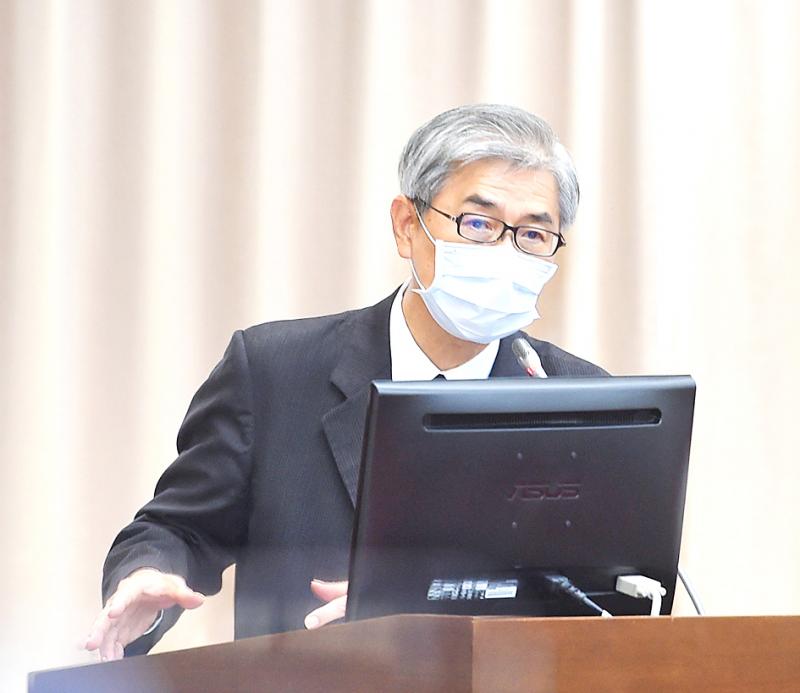The Financial Supervisory Commission (FSC) has denied companies the option of merging with special-purpose acquisition companies (SPACs) to list on the local stock market, commission Chairman Thomas Huang (黃天牧) told a meeting of the legislature’s Finance Committee on Tuesday.
The commission made its stance firm, even though Gogoro Inc (睿能創意) earlier this month announced plans to launch an initial public offering (IPO) on the NASDAQ via a merger with US-based Poema Global Holdings Corp.
The listing mechanism involving SPACs might not fit the local stock market, in which individual investors account for about 70 percent of all investors, while the majority of investors in the US stock market are institutional investors, who can take higher risks, Huang said

Photo: Fang Pin-chao, Taipei Times
Even the US Securities and Exchange Commission (SEC) has concerns about SPACs, he said.
Regulations in the US allow a SPAC to go public without any actual business or revenue, and a SPAC only exists to acquire a target company within two years, offering a way for a private company to go public and bypass the time and expense of an IPO, Securities and Futures Bureau Deputy Director Kuo Chia-chun (郭佳君) said.
This practice is in conflict with practices in Taiwan, as even by the loosest listing rules, the Taiwan Stock Exchange and Taipei Exchange must review financial reports of the companies seeking to go public, but a SPAC cannot produce financial reports as it does not have real operations, Kuo said.
The SEC is researching how to enhance protection for investors, after a SPAC exaggerated the profit potential of its target company, and until the US regulator has more comprehensive guidance or measures to protect investors, the FSC would not consider introducing the SPAC mechanism to the local market, Kuo said.
Singapore earlier this month unveiled its SPAC listing framework, making it the only Asian country that allows SPAC listings, and the FSC would also observe how Singapore fares, she said.

Among the rows of vibrators, rubber torsos and leather harnesses at a Chinese sex toys exhibition in Shanghai this weekend, the beginnings of an artificial intelligence (AI)-driven shift in the industry quietly pulsed. China manufactures about 70 percent of the world’s sex toys, most of it the “hardware” on display at the fair — whether that be technicolor tentacled dildos or hyper-realistic personalized silicone dolls. Yet smart toys have been rising in popularity for some time. Many major European and US brands already offer tech-enhanced products that can enable long-distance love, monitor well-being and even bring people one step closer to

Malaysia’s leader yesterday announced plans to build a massive semiconductor design park, aiming to boost the Southeast Asian nation’s role in the global chip industry. A prominent player in the semiconductor industry for decades, Malaysia accounts for an estimated 13 percent of global back-end manufacturing, according to German tech giant Bosch. Now it wants to go beyond production and emerge as a chip design powerhouse too, Malaysian Prime Minister Anwar Ibrahim said. “I am pleased to announce the largest IC (integrated circuit) Design Park in Southeast Asia, that will house world-class anchor tenants and collaborate with global companies such as Arm [Holdings PLC],”

Thousands of parents in Singapore are furious after a Cordlife Group Ltd (康盛人生集團), a major operator of cord blood banks in Asia, irreparably damaged their children’s samples through improper handling, with some now pursuing legal action. The ongoing case, one of the worst to hit the largely untested industry, has renewed concerns over companies marketing themselves to anxious parents with mostly unproven assurances. This has implications across the region, given Cordlife’s operations in Hong Kong, Macau, Indonesia, the Philippines and India. The parents paid for years to have their infants’ cord blood stored, with the understanding that the stem cells they contained

Sales in the retail, and food and beverage sectors last month continued to rise, increasing 0.7 percent and 13.6 percent respectively from a year earlier, setting record highs for the month of March, the Ministry of Economic Affairs said yesterday. Sales in the wholesale sector also grew last month by 4.6 annually, mainly due to the business opportunities for emerging applications related to artificial intelligence (AI) and high-performance computing technologies, the ministry said in a report. The ministry forecast that retail, and food and beverage sales this month would retain their growth momentum as the former would benefit from Tomb Sweeping Day